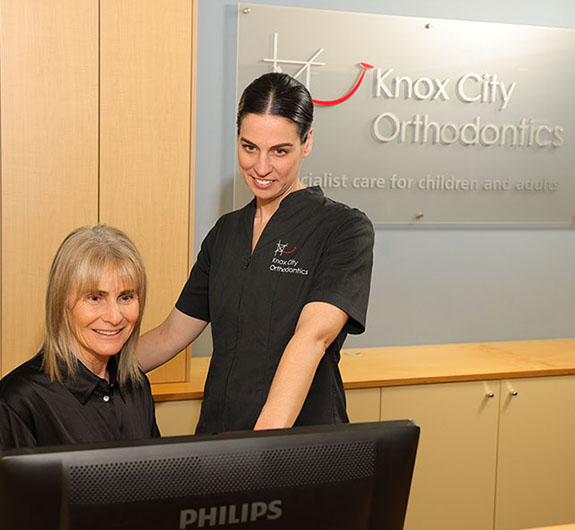Orthodontics is a skilled branch of dentistry and focuses on treating irregularities of the teeth and jaws. These irregularities -- such as crooked teeth, over or underbites, crowding or spacing issues -- can also affect the function of teeth, and the primary goal of orthodontists is to address these problems.
Sometimes our teeth and jaws grow in such a way that they aren’t positioned as straight as they could be. There are many reasons why this happens, for example, a heredity issue, childhood behaviour such as thumb sucking, poor oral hygiene or simply that your teeth and jaw don’t grow as well as they should. If you have crooked teeth, gaps between your teeth, protruding front teeth, or if your lower teeth sit over the top of your upper teeth, you could benefit from orthodontics.
If you need orthodontic treatment, you will need to see an orthodontist, who will assess your teeth and jaw and recommend treatment. Typically, this treatment will be in the form of braces or aligners, such as Invisalign treatment, which you will be required to wear for up to two years, depending on the problems with your teeth.
No, orthodontic treatment isn’t painful. You may experience some discomfort when your braces are tightened or your new aligners are fitted. This is the result of your teeth being encouraged to move further to their new desired position. This discomfort can usually be relieved by over-the-counter pain relief. If the discomfort doesn’t go away, please contact us.
Braces are certainly an effective method of straightening teeth, but these days you have more choice. Developments in technology and in orthodontic equipment mean there are other options available. These include the Invisalign clear aligners that fit over your teeth like a mouthguard and ceramic braces, which are tooth coloured brackets that blend in with your natural tooth colour.
It’s never too late to have orthodontic treatment. In fact, most orthodontic cases are now adults, rather than children and teenagers. Many adult patients are attracted to the more discreet treatment options, such as Invisalign aligners. Invisalign treatment consists of clear plastic aligners, which are only slightly visible if attachments are required.
Yes, they can and it’s very important they do if they need it. The Australian Society of Orthodontists (ASO) recommends children have an orthodontic assessment by the age of 8 as this is when potential issues can be identified and prepared for.
Yes, there are other options such as Invisalign for teens. This is specifically designed for the self-conscious teenager as it uses the clear plastic aligners which are virtually invisible. However, the type of orthodontic treatment that is most suitable depends on the extent of the work required. Book your teenager in for a free consultation with us and we can let you know the best treatment options available.
Orthodontic treatment is very specialised and requires a great deal of care. Although orthodontic treatment can be expensive, we advise you to look at it as a long-term investment in your health. We also have payment plans available to help make the cost of treatment more affordable.
A retainer is either a small removable plate or a piece of wire fixed to the back of your teeth that is designed to keep your teeth in their new position. This is the last stage in your orthodontic treatment journey and is perhaps the most important stage. Failure to wear your retainer could mean your teeth move back into their original position.
Wearing braces won’t stop you from being able to clean your teeth. In fact, it’s very important you take great care to clean them. We advise you brush and floss your teeth after every meal and use a fluoride mouthwash. A soft toothbrush or an electric toothbrush will enable you to clean your teeth, as well as the brackets and archwires of your braces, without any problems.
It is very unlikely that your braces will break but if they do, contact us as soon as possible to arrange an emergency appointment.
Still have questions? Let’s chat!
Every smile is different - and so are your questions. If you haven’t found the answer you’re looking for, our friendly team is here to help. Book a free consultation today and let’s talk through your options, one step at a time.
Book your free consultation

